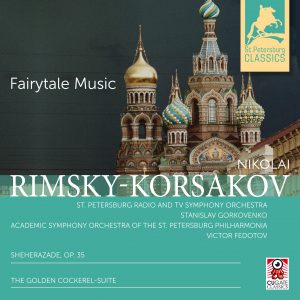 Facts & Figures
Facts & Figures
Nikolai Rimsky-Korsakov is renowned as a teller of musical tales. More than half of his 15 operas are based on fairy-tales: The Snow Maiden, Kaschey the Immortal, The Legend of Tsar Saltan and The Golden Cockerel to name but a few. Another of his most popular works is surely his symphonic suite Sheherazade, based on the tales of The Thousand and One Nights.
The four movements of the work are united both by their musical and their dramatic content. Rimsky-Korsakov creates wonders in his music, like a magician weaving a spell. Each theme, in his words “appears each time in a different light, depicts each time a different picture and expresses each time a different mood. The same motifs and themes are used at different times to represent different figures, actions and scenes.” The musical synthesis at the end combines those of the protagonists Sheherazade and her husband in gentle intimacy, which indicate that the tales have softened the Sultan’s cruel heart. This musical tale of the magical Orient ends with echoes of Sheherazade’s beautiful theme.
The Golden Cockerel is a ballet-opera based on Alexander Pushkin‘s 1834 poem The Fairy Tale of the Little Golden Cockerel. Actually Rimsky-Korsakov said he was finished with opera composing by 1907, but due to the political situation in Russia he decided to come back with a libretto, which with the means of satire performed a mirror image of the actual political situation in Russia, particularly the Russo-Japanese war 1904 – 1905, which Russia eventually lost. It is not a coincidence that Tsar Dodon is a kind of spitting image of Tsar Nikolai II, who came into the war against the feel of the Russian people as did Tsar Dodon, when he began to battle one of his neighbouring states. Consequently the opera was officially politically banned and could not be staged during the composers life. After his death in 1908, Alexander Glazunov and Rimsky-Korsakov’s son-in-law Maximilian Steinberg compiled an orchestral suite from the opera, consisting of four movements, which highlight the most important themes and melodies of the piece.
The present release with an extended playing time of 72:51 minutes comes from the 24 bit /96 khz state-of-the-art recordings out of the St. Petersburg Classics archive. They are carefully remastered by the prestigious Grammy awardwinning b-sharp studio Berlin using the original source material.
Liner notes in English. Design using spectacular views of St. Petersburg sites.
Stanislav Gorkovenko was born 1938 in Baku, the capital of Azerbaijan. He started his musical education at the local school of music, continued his studies as choirmaster at the Baku Conservatory and finally enrolled at the then called Leningrad Conservatory, where he enhanced his skills in the conducting class of the famous Professor Nikolai Rabinovich. After graduation he became music director of the Orchestra of the Leningrad Music Halls as well as the Theatre of Musical Comedy (1967 – 1978) where he initialized a.o. the performances of Helen of Troy and Mister X (after Kálmán’s Circus Princess).
Since 1978 Gorkovenko is artistic director and principal conductor of the Solovyov-Sedoi Orchestra, which is the former Radio and TV Orchestra. The range of his repertoire spans from classical, ballet and opera music right up to movie scores. In this field he worked for the film studio Lenfilm, producing music for more than 60 movies. As of early 1990s, the Radio and TV Orchestra under Stanislav Gorkovenko toured extensively in Europe and Asia. He has recorded more than 50 classical albums on CD.
Victor Fedotov, was born in 1933 in Novo-alexandrovka. In 1963 the young conductor, a winner of All-Union Competition, made his debut at the Theatre with “Carmen” by Bizet. He performed it by heart, without the scores; since then, Fedotov kept the tradition of conducting by heart during all his career. Since 1966, he regularly worked in the Royal Covent Garden Theatre in London. In 1967, he staged “Evgeny Onegin” by Tchaikovsky in Germany with the Staatskapelle Dresden.
Victor Fedotov’s repertoire included more than 60 operas and ballets. As Principal Conductor of the Mariinsky Theatre he was also the art director of all main ballet productions; all ballet stars of the Mariinsky Theatre always felt greatest respect and affection towards this outstanding musician, and together they made more than a 30 years’ epoche in the history of the Theatre. Victor Fedotov died in 2001.

